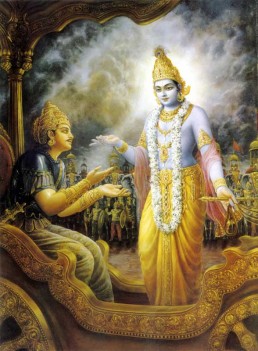Swami Chinmayananda
Swami Chinmayananda Commentary
As a contrast to the point-of-view of the ‘ignorant’ man explained in the last stanza, Krishna explains here the attitude of the ‘wise’ man when he ploughs the field of activity. In him, attachment has no place, because of his constant, discriminating understanding that in all activities, it is his mind that projects out to form the action. When once the ‘wise’ man has realised that actions belong to the world of the mind, he is no more anxious for the fruits thereof. Success and failure thereafter belong to the mind and not to him. Likes and dislikes thereafter are of the mind and not his. Loves and hatreds are not his but of the mind. Thus, in complete inner freedom the God-man functions, as a true sportsman in his play-field, where the very enjoyment is in the sport and not in the score.
Here, Arjuna is addressed as the ‘mighty-armed,’ and this is very significant in the mouth of Krishna at this moment. The very term reminds us of Arjuna’s wondrous heroism as the greatest archer of his time. The implication is that a true hero is not one who can face an army and kill a few, but one who can save himself. A true warrior is only he who can tirelessly fight in the inner world, and gain a victory over his own mind and attachments. One who can act in the world’s battle-field of actions, ever ruling over and never surrendering to the arrows of attachments that fly towards one from all directions, is the real Immortal Hero, who can thereafter sit unarmed on the chariots of mortal heroes, and without raising any weapon, can guide the destinies of many an army in every Kurukshetra! That Master Hero is called Tattwavit — one who “knows” the Reality — the Self.
NOW:
Adi Sankara Commentary
Tu, but, on the other hand; he who is a knower, tattva-vit, a knower of the facts;-knower of what kinds of facts?-guna-karma-vibhagayoh, about the varieties of the gunas and actions, i.e. a knower of the diversity of the gunas and the diversity of acitons; [Guna-vibhaga means the products of Prakrti which consists of the three gunas. They are the five subtle elements, mind, intellect, ego, five sensory organs, five motor organs and five objects (sound etc.) of the senses. Karma-vibhaga means the varieties of inter-actions among these.-Tr.] na sajjate, does not become attached; iti matva, thinking thus; ‘Gunah, the gunas in the form of organs;-not the Self-vartante, rest (act); gunesu, on the gunus in the form of objects of the organs.’
The Bhagavad Gita with the commentary of Sri Sankaracharya – Translated by Alladi Mahadeva Sastry
Holy Geeta – Commentary by Swami Chinmayananda
The Bhagavad Gita by Eknath Easwaran – Best selling translation of the Bhagavad Gita
The Bhagavad Gita – Translation and Commentary by Swami Sivananda
Bhagavad Gita – Translation and Commentary by Bhaktivedanta Swami Prabupadha
Srimad Bhagavad Gita Chapter 3 – Verse 28 – 3.28 tattva-vit tu – All Bhagavad Gita (Geeta) Verses in Sanskrit, English, Transliteration, Word Meaning, Translation, Audio, Shankara Bhashya, Adi Sankaracharya Commentary and Links to Videos by Swami Chinmayananda and others – 3-28

